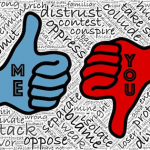
LIBBY ANNE, blogger at Love, Joy, Feminism (atheist): I thought we might look at women’s roles in politics this week — what roles they’re allowed to have, and so on.
REBECCA BRATTEN WEISS, blogger at Suspended in her Jar (Catholic): I was thinking something similar, with the election coming up and so much discourse that involves our identity, subtle sexism in critiques of female politicians, and all the rest.
Libby Anne: I feel like I can talk to two different perspectives. I’m here as a feminist and an atheist, but I also grew up evangelical. Within atheism, sexism is similar to that which we see in society in general — there are those who feel that women are more irrational, less able to lead, etc., and there are others who don’t believe that, who support equality whether or not they identify as feminists.
But this morning I was just remembering the tension I experienced growing up in an evangelical community. Conservative political activism was held up as crucial to the survival of our nation, but women’s place was to be in the home. I actually held a minor political position when I was 18 or 19. It was a very small elected position, but I was conflicted about it, and I hoped I would find a husband who wanted to go into politics so I could support his career. That would be an acceptable course of action for a woman — supporting her husband.
SAMAR KAUKAB, executive director of Arete at the University of Chicago (Muslim): I absolutely love this topic as it really gets to what are some of the more subtle nuances of the way gender interplays with power and leadership — particularly as it relates to what I see as misguided ideas that America is in a ‘post-feminism’ stage.
In particular, the absence or gap in female leadership as it relates to political and institutional power is fascinating (or more accurately, depressing) to probe across various sectors. This absolutely cuts across the way female leadership functions within most if not all faith communities. Within many American Muslim communities, this is an important conversation that is being played out in the midst of this election cycle. As we’re grappling with the big questions around feminism and female leadership that the election raises, we are concurrently asking a far more introspective question: What are our communities and institutions willing to promote and support when it relates to meaningful female leadership? Perhaps even more significant, are they willing to deem female leadership as an essential component of any healthy community?
Rebecca: When we look at political activity, I keep thinking about how we “can’t dismantle the master’s house with the master’s tools.” We’re in a bit of a bind, because so many of the structures are not only male-dominant, but male-created, so when we enter into them, we may find ourselves having to play by rules we don’t approve of. This is especially true for me as a pacifist. But the option to stay inscribed within a domestic space and try to change things there, as Libby mentioned, clearly doesn’t work, in spite of the claims of some post-feminists that we can have such wonderful influence there. We’re also both encouraged to use our sexuality for “empowerment” and criticized if we seem to be doing so.
Libby Anne: This makes me think of Abigail Adams, asking her husband to “remember the ladies” when he left for the Continental Congress. Clearly, her husband did not remember the ladies, as they were left without the right to vote, or frankly any rights whatsoever, given the law of coverture.
Samar: This idea of change from within neatly coupled with change resulting from external pressure is something I struggle a lot with. Clearly, multi-pronged strategies and approaches are required for meaningful change.
But if I’m really honest, I struggle with the idea of change from within the domestic sphere because it feels as if that kind of change has been historically and societally imposed by those in privileged positions of power. So it becomes difficult not to see that as a form of ‘change light’. I know that’s not the case necessarily — we absolutely need the pressure to change coming from all fronts and every sphere, including the domestic and traditional. At the same time, I’m so utterly sick of ‘women’s issues’ being relegated to the side stage. Gender is a huge component of this campaign, yet men in my faith community (while, of course, protesting the way HRC is being treated) still have no problem with all-male panels, male spaces, and male boards within the community.
Libby Anne: About a century ago there was the idea of “municipal housekeeping,” or in other words that running a town or city were in some ways similar to running a home, or at least, that it should be seen as similar. This was during the Progressive Era when governments were taking on new functions and things were becoming more orderly, almost after the fashion of factories, with schools laid out in organized systems, etc. Anyway, women used the idea of municipal housekeeping to push for women’s rights and to extend women’s influence — to argue that women should have some role in the public sphere, because their experience and talent as housekeepers was relevant.
Rebecca: This reminds me of the fact that the root of “economics,” oikos, refers to the household — economics as housekeeping, housekeeping as economics. The idea that the domestic space and the political space should be sharply separated is, I think, artificial, and connected with very limited ideas about what family means and what politics means.
Libby Anne: It also stems from a very specific time. After the American Revolution, the economy began changing, and those in what became the “middle class” would buy a house outside of the town center, in what would become the suburbs. But part of what was happening is that work was being separated from the home. Previously they’d been the same place, generally, with a shop and living quarters above. So the home was envisioned, once separate, as a place of calm and peace away from the dirty world of work, to be tended by the wife and mother.
Samar: Rebecca, what you said there really resonates with me in the sense that in some traditional Islamic depictions the domestic sphere (the interior life) and the public sphere are given gendered qualities. The home is a feminine space — beautiful, serene, quiet — whereas the public sphere is rough and masculine, powerful, loud, even chaotic.
Moving beyond the imagery itself, this idea of a stark separation between the public and domestic spheres — seeing these as distinct environments — is deeply entrenched in values that are subsequently expressed around femininity and masculinity that have very little to do with actual lived realities. And who suffers most for it? Women and those who are relegated to not having the same opportunities or porousness between both worlds.
There is a sense of honor placed on the interior life — almost as an appeasement — that this is the place we (particularly men) return to find calm in the midst of a chaotic, messy world. Except that, obviously this kind of stark separation only works in…well, nowhere. In reality, people have complex ideas and need to be able to move back and forth between both spheres freely and with full agency. Unfortunately, given this imagery, it’s really only men who are afforded this basic right.
Rebecca: Libby’s mention of the rise of the middle class makes me think also of the Industrial Revolution and the increasing dominance of technology. So Samar, what you say about this stark gender separation (home = soft; work = hard) seems to be very much a product of a technological framing, where the men are out “producing” in a world of factories and machines, while women create the refuge for the producers. In earlier times, with a more agrarian view of work, this would not have been so starkly defined. Farm work is inside and outside the home, and it can be both very rough and very nurturing.
Libby Anne: Samar, your point that women can’t go back and forth between the two worlds in the way men can is fascinating. Women in the Antebellum period did so by becoming involved in charitable work, in reform efforts, the temperance movement, etc. So women could enter the public sphere, but only if they did so in womanly ways, ways that were an extension of the domesticity and ethic of caring practiced in the home home. In other words, the woman as caregiver. And I actually think we still see that today. Think about how Hillary Clinton positions herself as having a long history of caring for others, especially women and children.
Samar: Yes, I wonder a lot about what both of you are saying. How much of our current religious values — the values we are told to prioritize above others — are really just a function of a post-industrialized society or other increasingly irrelevant political/economic goals? In many ways, these values (the things that make us seemingly more pious or faithful as explained to us) exist to reinforce some other goals.
Even this notion that women are too emotional to lead is entirely outside the scope of a modern, complex global economy. I wonder how and where our religious values might be morphing or differently prioritized eventually in acknowledgment of that. Clearly, feminism from a faith-based or community perspective is an indicator of something here.
Rebecca: For those of us in male-led religions, the idea that we have to get to God through a male intermediary means that for women, the virtue of obedience is especially stressed. And obedience to God gets blurred with obedience to men, or societal structures created by men. It still blows my mind how many otherwise intelligent people still push an idea of sharply gendered virtue.
Libby Anne: I don’t talk about this a lot, but between being an evangelical and ultimately becoming nonreligious, I converted to Catholicism. And at one point during that time, my husband and I were involved in a covenanted community. Each individual in the community had a spiritual “head” they would meet with and report to and listen to for advice. For the men, it was another male member of the community. For unmarried women, it was another woman in the community. But for married women, it was their husband. I thought this was odd at the time, because who would the woman go to if she was having a problem in her marriage? But the argument was that giving her another “head,” say another woman in the community, would undermine her husband’s authority over her.
Rebecca: Libby, that is fascinating. Our family almost joined one of those communities, but luckily my dad saw how cultish they were. But we were always involved in some kind of religious community or commune scenario – protestant and Catholic – and there were always two continuous motifs: an overbearing male leader convinced he had a direct line to God, and sexual shenanigans being hidden or covered up.
Samar: In many traditional Muslim communities, gender segregation is still seen as the fix-all for every single social problem that has ever existed. Teens having sex? Gender segregation. Sexual abuse? Gender segregation. Climate change? Gender segregation. It is utterly laughable a) because its completely absurd and b) because there is this harebrained idea that a simple approach could solve these highly complex and multilayered issues that are experienced in such distinct and diverse ways.
But more importantly, what isn’t discussed is the opportunity cost or consequences of promoting gender segregation as a social policy in our institutions. For instance, the physical spaces for women are neglected, second spaces. They’re literally dingy and dark. Not only do these spaces physically take up less square footage, but they also consequently relegate women to occupying less square footage in the psychological, political, and spiritual sense as well. So when real issues and concerns do arise there literally is no good way to approach or address them. And everyone in the community loses, both men and women.
Rebecca: That reminds me of “A Room of One’s Own,” and how the men have huge opulent college rooms with wonderful meals, and women are crammed into shabby places eating prunes. You can’t discount the significance of our physical spaces, how they affect us, how the rooms we’re in tell us what we can do or not do.
Libby Anne: So Samar, one thing historically is that women in the U.S. in the past, when things were more gender segregated than they are now, would forge strong bonds with other women, strong networks and communities. A woman would often be closer to her female friends than to her husband, and a man would be closer to his male friends than to his wife. I would imagine you see that in traditional Muslim communities too?
Samar: Yes, absolutely. There are significant gains and assets in having access to female only spaces. In many Muslim societies, this was the place where women could learn about sexuality openly and frankly, for instance. Not only was this a place to formally learn about sexuality, but also informally. One could quite easily find women joking about sex or commiserating about their experiences. It is in these spaces that many women learned to develop the vocabulary needed to even talk about sex. Without these spaces, these conversations in many communities becomes stilted or nonexistent. The issue is when gender segregation is imposed vs when it’s chosen. Again, this leads back to agency both on the individual and community or identity level.
Libby Anne: To bring this back to politics, even though we see less gender segregation in society in general today, friendships are still most commonly formed along gendered lines. And that means that in a society where men already hold the vast majority of political offices, politically active men will benefit more politically from their friendships with other men more so than politically active women will from their friendships with other women.
Samar: Yes, the boys network is absolutely a real thing!
Libby Anne: Oh I know! I just hadn’t thought about it in tandem with the “separate sphere” or gendered limits of friendships specifically. Somehow it sounds harder to solve the way I just laid it out than it did before I’d connected those things.
Rebecca: Do you all find that some or even many women resent you for being feminists, or for boring them with talk about activism, and that sort of thing? Because I often find myself very isolated, and in some of my friendships I have to leave out this whole side of my being.
Samar: That’s a great question, Rebecca. I too often struggle with ‘Yay! I’m the boring feminist ready to kill the party!’ At the same time, I’m hopeful as I see more and more women, particularly in this campaign season, acknowledging their feminist values expressed or latent. I’ve been fascinated with the evolution of FOX News journalist Megan Kelly, including her recent interview with Newt Gingrich.
Libby Anne: Again, I feel like I have two perspectives to offer. My secular friends are all fairly politically active too, so our problem is more that our political conversations wax late into the night than anything else. Growing up in an evangelical homeschool community, it was actually similar — conservative politics was so entwined with our evangelical beliefs that everyone was political. I spent a lot of time as a teen talking politics to my friends (who were all evangelical like me). But that may have been a quirk, in part, of being in a specific type of homeschool community — we had leaders at our homeschool conventions arguing that the entire point of homeschooling was to raise good, godly children to go out and retake America for Christ, both culturally and politically. It was what we were being raised to be.
Rebecca: We were very political growing up, even though very isolated. I think it’s a familial obsession. I can’t really imagine not having an interest in the laws and culture that affect how I live, how I exercise my rights, the safety of communities and the environment. I’m not good at being an ivory-tower academic: if I study ethics, and the nature of friendship, and ecology, all that has to transfer into the way I relate to the larger culture. So being a feminist is kind of a logical outgrowth of that, because injustice towards women not only directly harms our ability to flourish; it’s, connected with so many other wrongs in our culture.
Samar: That’s fascinating to think about the role that upbringing has in making people comfortable with these complex issues of identity. Growing up, I similarly was raised in a home that was very political. Everything was political even when it wasn’t. Similar to what both of you were saying, there wasn’t a separation between my values and how I desired or wanted to live. I wanted – actually needed – the values I was learning about to be expressed in the world I lived in. I’ve never been interested in theory or ideas existing in ivory towers with no real world implication. That’s never even been an option for the kind of work I’m interested in as it relates to feminism and American Muslim communities.
Libby Anne: Even though I’m no longer an evangelical, I wonder sometimes if the emphasis on being part of the solution to the problems in politics and culture helped me as I embraced feminism upon adulthood. There was always a tension there, being told that there were these huge societal problems that we desperately needed to fix, but also that my role as a woman was in the home, raising children. There are some models within evangelicalism for female leadership, such as Deborah in the Old Testament, but those were always presented as second best to male leadership, and only to be undertaken when there were no men there to do so. That didn’t exactly mesh with my passion and drive. I never felt second best.
Image via Shutterstock











